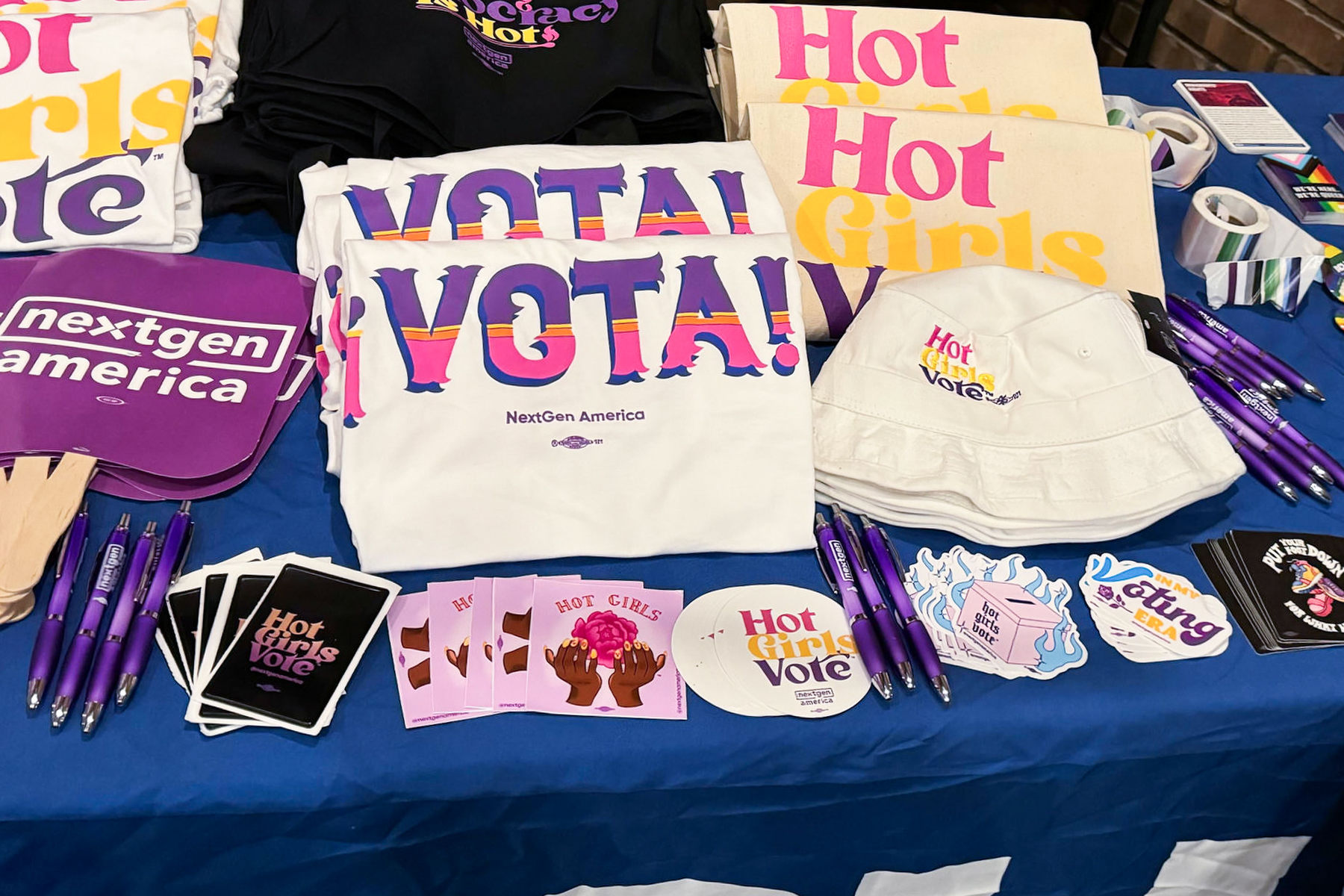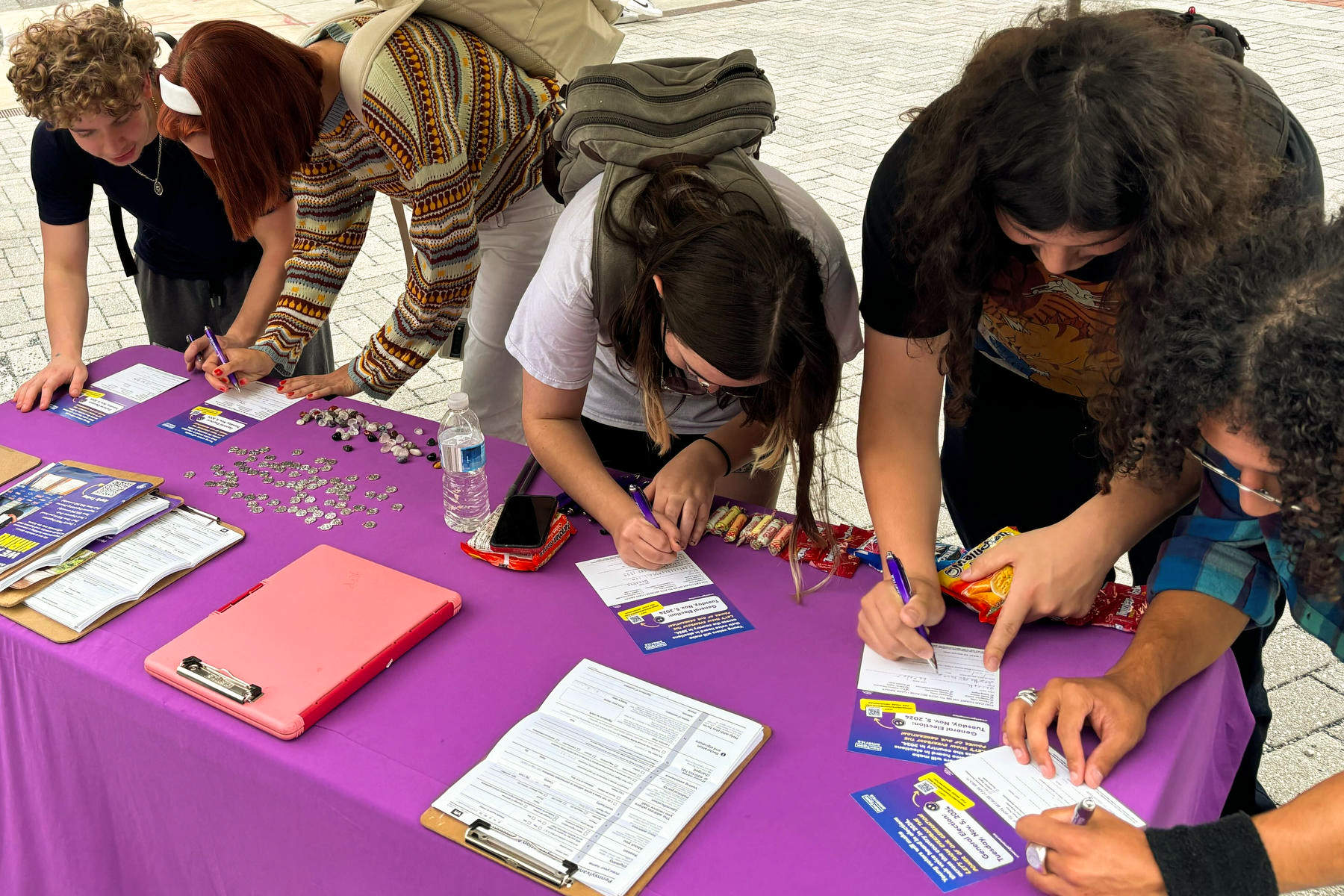The 19th is committed to covering the unfinished business of voting rights. Read more about how we’re approaching that in this pivotal election.
In North Carolina, Republicans sued to stop the use of electronic identification that some public university students planned to use for voter ID.
In Texas, they attempted to reduce early voting polling sites on college campuses in one of the most populous counties in the state.
In Ohio, GOP state legislators passed a bill requiring new voter identification that advocates warned could have a disproportionate impact on out-of-state college students.
With roughly a month to go until the presidential election, young people and college students face potential challenges at the ballot box — both last-minute and as part of laws enacted after 2020 through state legislatures. Republicans are primarily leading these efforts, which come at a time when they’ve increasingly expressed skepticism in America’s elections despite little proof of widespread voter fraud. Former President Donald Trump continues to claim without proof that there could be extensive cheating in the upcoming election.
These moves could have the most impact in the battleground states that will determine the outcome of a historic presidential election.
“You have to really want to vote to overcome all of those barriers,” said Tappan Vickery, senior director of programming and strategy for HeadCount, a nonpartisan organization that leads voter registration drives that often targets young people.
Every state has a different deadline for people to register to vote — and many of these deadlines are fast approaching. Find the relevant deadline for your state here.
And young people want to vote, said Kristin McGuire, executive director of Young Invincibles, a nonpartisan organization aimed at getting young people involved in the political process. While McGuire noted that they vote at a lower rate than the rest of the population, she also pointed out that young people today vote at the same level or higher than previous generations did at the same age.
In the 2020 election, half of young people ages 18-29 voted — an 11-point increase over the previous presidential election.
“We just tell young people they don’t vote, erroneously, based on some anecdotal knowledge that’s just simply not true,” she said. “It’s an incorrect talking point.”
Young people are poised to be a potent voting group. According to the nonprofit think tank MAP, an estimated 53 million voters under 30 will be eligible to vote this election cycle — including about 8 million since the 2022 midterms. And data indicates that young women vote at higher rates than young men. That includes on college campuses, where women are more likely to be enrolled.
Voter identification laws require eligible voters to show specific forms of ID at the ballot box, including those that contain a photo. Find out which states have ID laws here.
College students are trying to help fellow classmates prepare for the election despite these barriers. Ariella Bucio, a senior at Penn State University, is a paid deputy field organizer for NextGen America, the national youth voting organization. Launched by Tom Steyer, a former Democratic candidate for president who first focused the group on climate issues, the organization works across eight states, most of these battleground states. Its field operations teams have registered more than 51,000 young people to vote since mid-August. Since its founding in 2013, the group says it has registered 1.6 million young people.
“I love it,” Bucio said of her part-time outreach work, which primarily involves asking students on campus if they’re registered to vote and whether they have a voting plan.
Bucio said she handles a lot of questions from students about Pennsylvania’s residency rules, which require people to live in their election district for at least 30 days before the election. That can be confusing to first-time college student voters who are new to the state.
“When I first started, it was a lot of information to take in, because you kind of need to know all these policies that your specific state has in place,” she said. “Once I learned everything and got the hang of it, it was really nice to have all of this information and be able to help other people figure out what they needed to do.”

Tappan said understanding residency rules — which vary by state — make it harder for young people to vote. If they vote based on their parents’ home address, they may need to travel back home to vote or vote by mail. Either way, they need to know rules and deadlines for requesting and submitting ballot information.
“What we are seeing right now is that even in states where being away at school is an excuse and an excuse is required for a mail-in ballot, we are seeing that it’s becoming increasingly hard for those to get approved,” she said. “Young people are getting them denied, not knowing why. And that’s a very frustrating point because they’re trying to figure this out on the front end to make sure they’re able to vote.”
Alyssa Canty, youth programs director for the national nonpartisan voting rights group Common Cause, said young people’s first experiences in elections can have a ripple effect on their voter enthusiasm for years.
“For all of those thousands and millions of people who this is their first election that they’re voting in, what they encounter at the polling site can either make them excited and feel positive and always want to make them a voter,” Canty said. “Or they can experience hardships that cause them not to be those lifelong voters.”
Last month, a Republican judge in Tarrant County, Texas, attempted to reduce early voting on college campuses in the county, one of the most populous in the state. He claimed it would be a cost-saving measure; county officials later rejected the effort. There have been similar efforts over the years in Texas and elsewhere.
“Whether it’s a state initiative, a board of elections or partisan issue, there’s always a movement to remove campus polling sites, whether they’re early voting sites or Election Day sites,” Canty said. “We usually do a strong advocacy push to maintain those sites, knowing that students don’t always have transportation. But a lot of it is a tactic to try to decrease the youth vote.”
Are you planning to vote by mail this election? This is sometimes called absentee voting. Here are the deadlines by state and information on how to track your ballot.
In Florida, a 2023 law with new rules on third-party voter registration groups has in some cases halted student group get-out-the-vote efforts.
Earlier this year, the Idaho Supreme Court upheld a pair of laws that eliminated the use of student IDs for voter registration and in-person voting.
In North Carolina, Republicans filed a lawsuit last month to stop the use of electronic identification issued by the University of North Carolina at Chapel Hill as an acceptable ID to vote. A judge’s ruling then refused the request, which paved the way for students to use the identification to cast their ballots. A North Carolina appeals court subsequently blocked that, meaning students can’t use the IDs after all. (In response, the school is now offering physical cards at no charge.)
Policymakers underestimate how difficult it can be for a young person to register to vote, especially for the first time, according to Vickery. While some states do not have online voter registration, others might halt the process if a student has a residency discrepancy — a common occurrence for out-of-state students and others who have moved recently.
“The reason why this is a challenge for our Gen Z college students, who do everything on their phones, is that they aren’t able to easily use online voter registration portals,” she said. “And so when they go in to try to register to vote at their student address, or at their college, and their ID isn’t either from the right state or the address doesn’t match, they get a pop-up or a notice that says that they don’t have what they need to register. So a lot of people will automatically be like, ‘I can’t register. I don’t have what I need.’ And that turns them off from the process right there.”
In between her classes at Arizona State University, Divina Ranger, another deputy field organizer for NextGen, wants to talk about voting.
“Are you registered to vote?” the junior asks repeatedly from pop-up tables set up around the university’s campus in Tempe, a city just east of Phoenix.
“Let’s check your voter registration status,” she’ll add if someone isn’t sure.
Ranger is also working within bifurcated voting rules in Arizona, a crucial battleground state in the presidential election where residents must show proof of citizenship to vote in local and state elections. A Supreme Court ruling in August effectively upheld the setup. College students and others in the state without proof of citizenship can vote in federal elections and are on a “federal-only” list.
An analysis last year by the newsroom Votebeat showed college students are more likely to be on the federal-only list.
Ranger tries not to inundate would-be voters about the rules — which are all tied to court rulings and pending litigation.
“Students, they’re thinking about their next exams or the next paper,” she said. “So if we try to overwhelm them with what’s happening with the courts, they’re less likely to sign up to vote and may think, ‘It’s too much of a hassle.’ That’s at least what I’ve found in my conversations.”
McGuire added that young people can struggle to find fact-based information about voting.
“We hear from young people all the time that they don’t know what’s real and what isn’t based on social media,” she said. “So we’re really happy to kind of serve as that trusted messenger.”
Vickery encouraged college students and other young people to bring friends to the polls.
“If you are someone who understands this process, or you’ve already figured it out and you’re on campus, be that friend that reaches out to your roommates, or your classmates, or your co-workers, and see if y’all want to vote together,” she said. “Doing that peer-to-peer work in your life, where you become the person that can share valid and correct information, is an incredible resource. Don’t keep your process in a vacuum, and share it with the people around you.”
Are you a college student or young person who plans to vote in this election? Whatever your plans — from requesting a mail-in ballot or intending to use public transportation to vote on Election Day — tell us about it.
To check your voter registration status or to get more information about registering to vote, text 19thnews to 26797.






